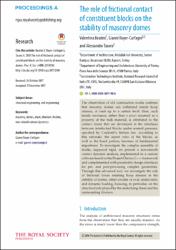The role of frictional contact of constituent blocks on the stability of masonry domes
Citation
PROCEEDINGS OF THE ROYAL SOCIETY A-MATHEMATICAL PHYSICAL AND ENGINEERING SCIENCES Volume: 474 Issue: 2209 Article Number: 20170740 DOI: 10.1098/rspa.2017.0740Abstract
The observation of old construction works confirms that masonry domes can withstand tensile hoop stresses, at least up to a certain level. Here, such tensile resistance, rather than a priori assumed as a property of the bulk material, is attributed to the contact forces that are developed at the interfaces between interlocked blocks under normal pressure, specified by Coulomb's friction law. According to this rationale, the aspect ratio of the blocks, as well as the bond pattern, becomes of fundamental importance. To investigate the complex assembly of blocks, supposed rigid, we present a non-smooth contact dynamic analysis, implemented in a custom software based on the Project Chrono C++ framework and complemented with parametric-design interfaces for pre- and post-processing complex geometries. Through this advanced tool, we investigate the role of frictional forces resisting hoop stresses in the stability of domes, either circular or oval, under static and dynamic loading, focusing, in particular, on the structural role played by the underlying drumand the surmounting tiburium.


















